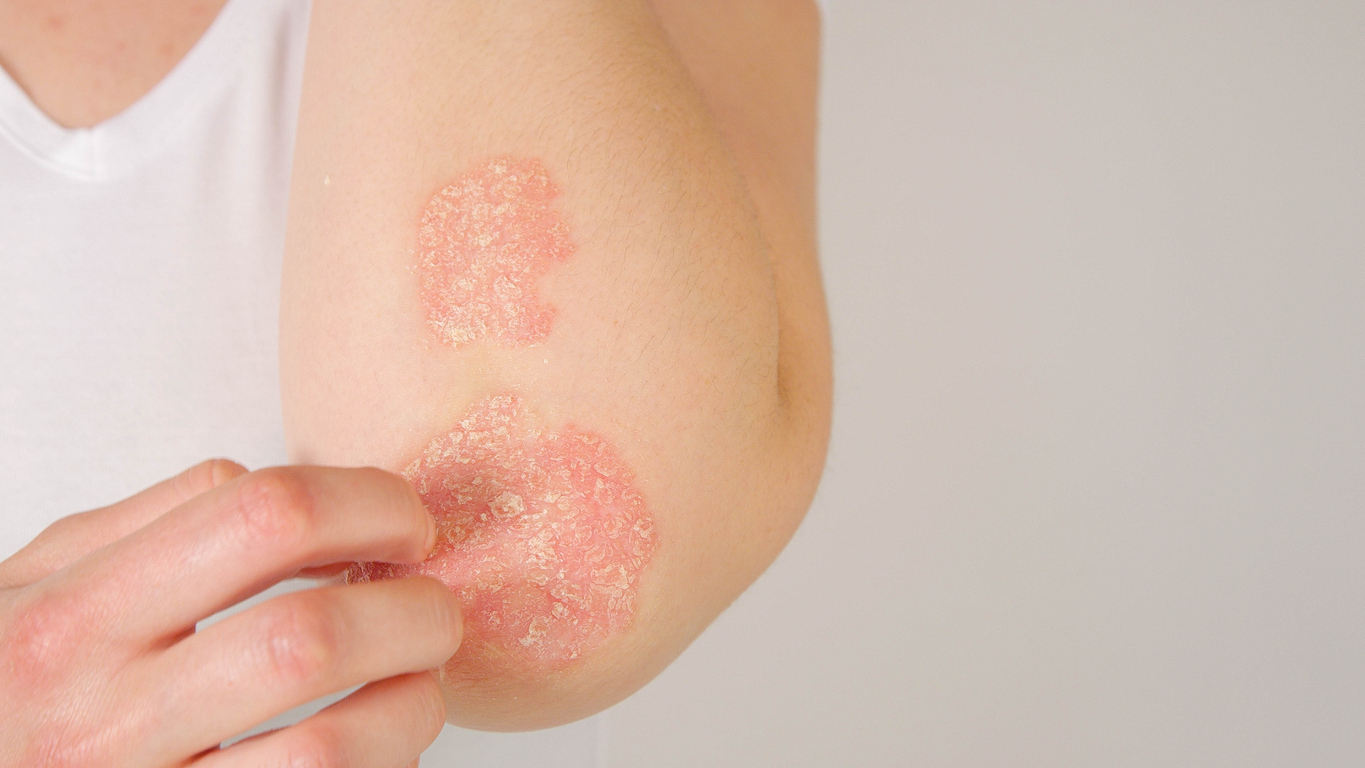Psoriasis
Psoriasis Dermatolgist in Dallas, TX
Psoriasis is a skin condition that develops when the body generates skin cells too quickly, causing them to pile up and form raised plaques and scales on the skin. Normal skin cells completely grow and shed in about a month but with psoriasis, skin cells do this in only three or four days. Men, women, and children of all skin colors can get psoriasis. Psoriasis is not contagious.

Symptoms
Symptoms can begin at any time, but often start between ages 15 and 25. Dry, thick, and raised patches on the skin are the most common sign of psoriasis. These patches are often covered with a scaly, sometimes silvery coating and can itch, burn, and sting. Plaques and scales can occur anywhere on the body but are most commonly found on the elbows, knees, and scalp.
Symptoms also vary based on the type. According to the AADA, there are five main types of psoriasis:
Plaque (plack)
- Patches of thick, raised skin called plaques
- Scale (a dry, thin, and silvery-white coating) covers some plaques
- Plaques of different sizes
- Smaller plaques joining together to form larger plaques
Guttate
- Small and scaly
- Salmon-colored to pink
- Temporary, clearing in a few weeks or months without treatment
Inverse
- Smooth, red patches of skin that look raw
- Little, if any, silvery-white coating
- Sore or painful skin
Pustular
- Red, swollen skin that is dotted with pus-filled bumps
- Extremely sore or painful skin
- Brown dots (and sometimes scale) appear as the pus-filled bumps dry
Erythrodermic
- Skin on most of the body looks burnt
- Chills, fever, and the person looks extremely ill
- Muscle weakness, a rapid pulse, and severe itch
Psoriatic Arthritis
Some people who have psoriasis develop a type of arthritis called psoriatic arthritis. This is more likely to occur if you have severe psoriasis. Initial symptoms can be subtle but include:
- A swollen and tender joint, especially in a finger or toe
- Heel pain
- Swelling on the back of your leg, just above your heel
- Stiffness in the morning that fades during the day
Causes
Psoriasis is an immune-mediated disease, meaning the cause is unknown but is thought to be influenced by genetics and an irregular immune response. This immune system dysfunction causes inflammation in the body and in the case of psoriasis, the inflammation becomes visible on the skin. Immune system changes can be caused by certain events or factors, triggering the start of psoriasis symptoms. Common triggers include stress, illness (particularly strep infections), injury to the skin and certain medications.
Treatment
There is no cure for psoriasis but there are several treatments available to help reduce or eliminate your symptoms. Each case is different and finding the right treatment(s) can be tricky, so it is important to work closely with your dermatologist to figure out which treatment plan works best for you. Treatment plans include:
- Topicals (steroids, non-steroids, and OTC creams, lotions, shampoos, etc.)
- Prescription medications
- Phototherapy (light therapy)
Self-Care
After working with your dermatologist to create a treatment plan and manage your psoriasis, it can be helpful to practice self-care techniques to help keep it under control. This includes reducing stress, moisturizing dry skin, quitting smoking, avoiding products that irritate your skin or rubs the psoriasis, and eating a healthy diet.
The experienced doctors and staff at White Rock Dermatology provide extraordinary care and a personal focus, and will work with you to manage your psoriasis and relieve your symptoms. Reach out today and request your appointment!
